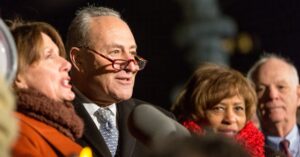Senator Rand Paul Names Elon Musk As Possible House Speaker In Light Remark
Senator Rand Paul recently raised eyebrows by suggesting Tesla CEO Elon Musk as a possible Speaker for the House, though he later indicated it was not a serious proposal.
Rand Paul's offhand suggestion about Elon Musk serving as House Speaker garnered significant media coverage, illustrating the weight carried by his comments.
During a Fox News Channel interview with Maria Bartiromo aired last Sunday, Senator Rand Paul humorously mentioned Elon Musk, a prominent business leader, as a potential candidate for Speaker of the House. The remark was made amidst discussions on wider political and fiscal issues.
Clarification and Media Reaction
Senator Paul later clarified his statement suggesting Musk for Speaker, noting it was meant in a lighter vein. "You know, it might have been a little tongue-in-cheek," Paul said, indicating his comment was more humorous than literal.
The suggestion, however, was picked up by various media outlets as a significant point of discussion, leading to portrayals of Musk in a political context which Paul had not intended as serious.
Paul expressed his admiration for Musk's engagement with topics such as government inefficiency, a subject Paul himself has been vocal about. "I think Elon’s got some important stuff to do, building rockets and making Teslas. But I do appreciate his input, and he has changed the debate. He’s drawing attention to the things I have been talking about for a decade, the waste," he commented.
Festivus: A Platform for Discussing Waste
In addition to discussing Musk, Paul mentioned the upcoming celebration of Festivus, a fictional holiday from "Seinfeld," which he uses to highlight government waste. "Tomorrow, we will be celebrating Festivus, the made-up ‘Seinfeld’ holiday. But, in that, we will be talking about a lot of the waste," Paul noted.
He targeted specific examples of what he considers wasteful spending at the National Institutes of Health (NIH), critiquing their expenditures on diversity, equity, and inclusion initiatives. "We have talked — I mean, ridiculous, crazy things, for example, $760 million spent at the NIH on diversity, equity, inclusion," he shared during the interview.
These criticisms extended to NIH-funded studies that Paul viewed as unnecessary or misdirected, such as the $600,000 used to research microaggressions among obese Latinx individuals.
Debate on Government Spending and Policy
Paul's commentary on NIH funding highlighted his broader concerns with government spending. He pointed out an apparent mismatch between the NIH's objectives and their actual expenditures. "I thought they were studying science over there. Nope, it’s about race. That’s crazy — $600,000 to discuss why there are microaggressions among obese Latinx. What does that even mean?" he questioned.
The senator's frustration with fiscal policies was evident as he tied these issues back to national budgeting practices, emphasizing the connection between governmental spending and debt policies. "This is why we can’t rest until we cut spending, and we can’t just raise the debt ceiling without actually cutting spending," said Paul, advocating for stringent fiscal discipline.
This conversation reflects ongoing debates over fiscal responsibility and the role of government in regulating and redirecting financial resources, with Senator Paul at the forefront of advocating for change.




